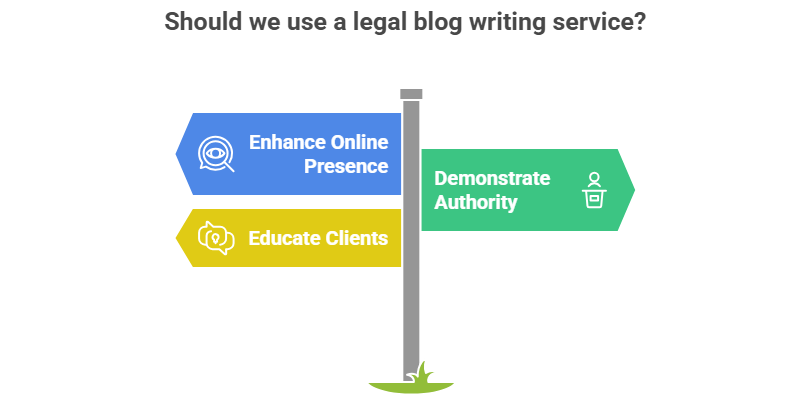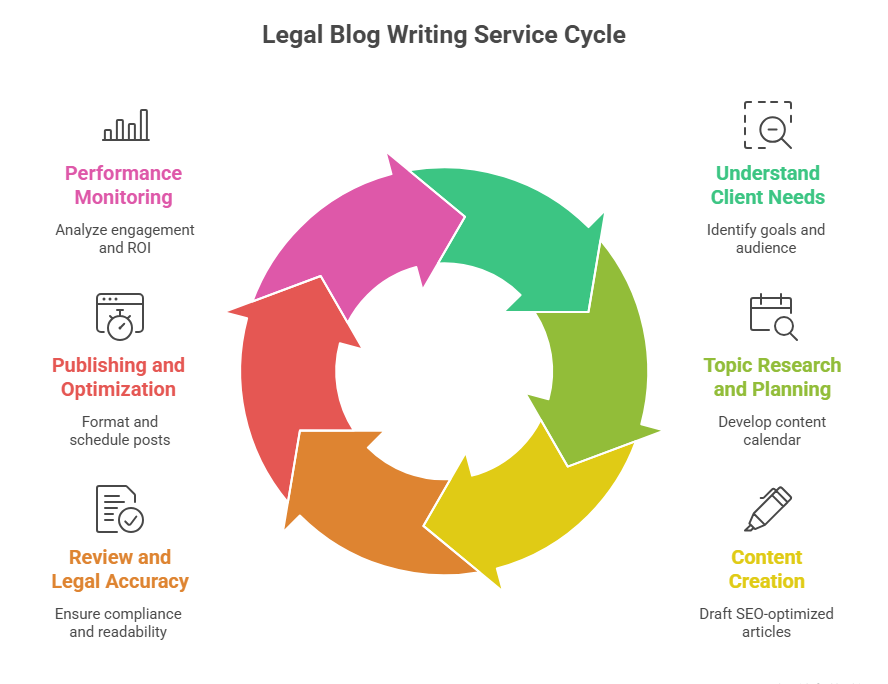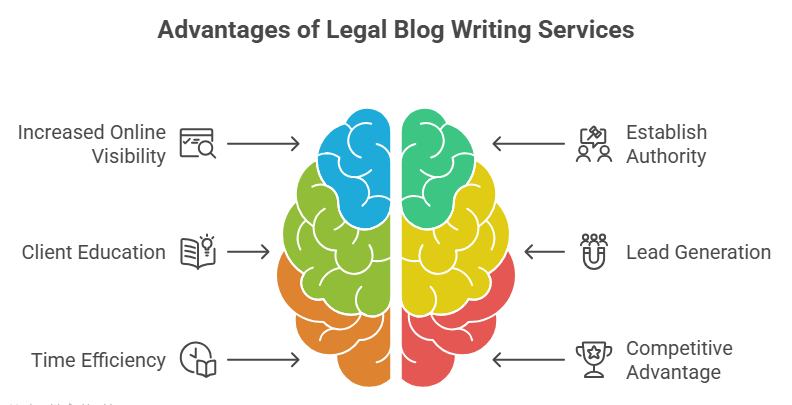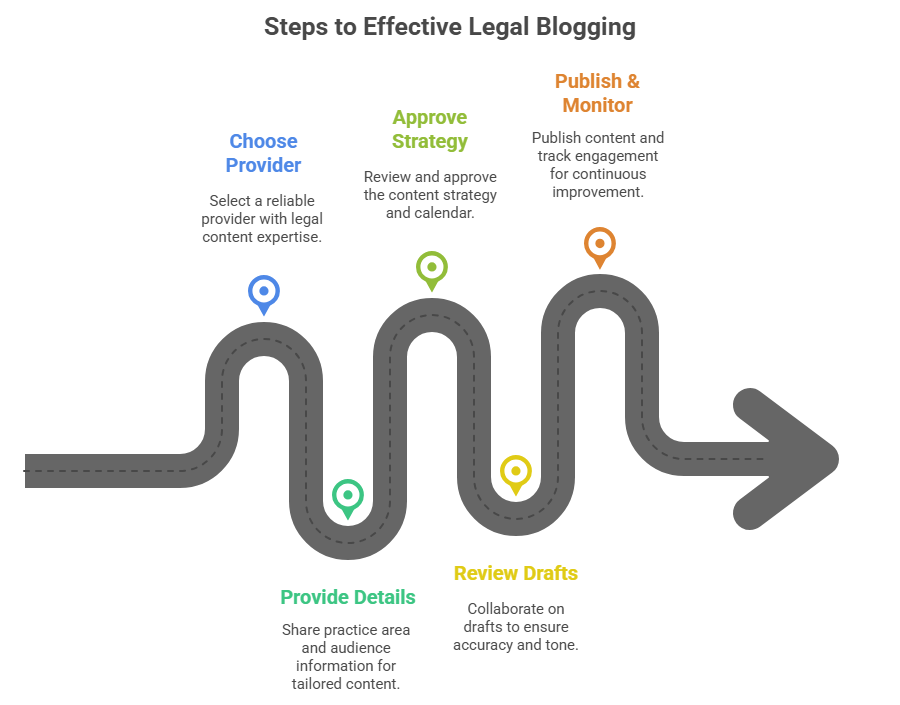
Legal Blog Writing Service: Drive Clients and Elevate Online Visibility
A Legal Blog Writing Service helps law firms, attorneys, and legal professionals create high-quality, informative, and SEO-optimized blog content. These services focus on legal expertise, readability, and online visibility, helping firms attract clients, establish authority, and improve search engine rankings.
What Is a Legal Blog Writing Service?

A Legal Blog Writing Service is a professional content creation solution tailored specifically for the legal industry. It produces articles, blog posts, and website content that combine legal accuracy with SEO optimization to reach potential clients and showcase expertise.
Unlike general content writing, legal blog writing requires a deep understanding of laws, regulations, and legal terminology while remaining accessible to readers. These services help law firms demonstrate authority, educate clients, and improve their online presence through consistent, high-quality blogging.
How Legal Blog Writing Services Work

To fully understand the value of a Legal Blog Writing Service, it’s important to break down the process. Each stage plays a crucial role in delivering professional legal content that not only engages readers but also boosts SEO and online authority. Below are the six major steps most providers follow.
1. Understanding Client Needs
The first step involves learning about the law firm’s goals, target audience, and areas of practice. Service providers conduct interviews or consultations with attorneys to identify what type of content best aligns with the firm’s brand. This ensures that each blog post directly addresses client concerns while reflecting the firm’s expertise.
2. Topic Research and Planning
After clarifying client needs, professional writers and strategists conduct in-depth research on trending topics and frequently asked legal questions. A content calendar is developed that outlines when specific posts will be published. This organized approach ensures consistency and maximizes SEO opportunities.
3. Content Creation
Once topics are chosen, professional legal writers begin drafting the blog posts. Each article combines accurate legal information with clear explanations, ensuring accessibility for readers without legal backgrounds. SEO best practices, such as keyword integration, optimized headings, and meta descriptions, are applied to enhance search rankings.
4. Review and Legal Accuracy
Drafts are carefully reviewed for legal accuracy, compliance, and readability. Many services involve attorneys or subject-matter experts in the final approval process to avoid errors or misleading content. This step ensures that the final product builds credibility rather than risking compliance issues.
5. Publishing and Optimization
After approval, the content is formatted for the law firm’s website and optimized for SEO. This includes proper structuring with subheadings, meta tags, and internal links. Posts are scheduled for regular publishing to maintain consistency.
6. Performance Monitoring
The final stage involves tracking analytics such as page views, engagement, and conversion rates. This feedback helps law firms measure the ROI of their blogging strategy. Insights from data analysis also guide future content planning and adjustments.
Key Features of Legal Blog Writing Services
A Legal Blog Writing Service stands out because of the specialized features it provides. These features ensure that law firms receive content that is accurate, engaging, and effective in boosting visibility. Here’s a breakdown of the most important features.
1. Legal Expertise
Content is crafted by writers who understand legal terminology and concepts. This ensures accuracy while still making the information approachable for the average reader. The combination of expertise and readability builds client trust.
2. SEO Optimization
SEO optimization is built into every blog post through keyword integration, metadata, and internal linking. By targeting practice-specific keywords, firms improve their chances of ranking in Google search results. This helps attract more potential clients searching for legal advice online.
3. Audience Engagement
The writing style is tailored to engage readers who may not have legal knowledge. Complex legal concepts are broken down into simple, easy-to-understand explanations. This encourages readers to stay longer on the site and trust the firm’s expertise.
4. Regular Posting
Consistency is key to building authority and visibility. Services provide a structured publishing schedule to ensure new content is regularly added. This keeps the website active and signals relevance to search engines.
5. Research-Backed Content
Blog topics are backed by legal research, case studies, and reliable references. This elevates the credibility of the content and distinguishes the firm from competitors with generic posts. Accurate, research-based content also strengthens client confidence.
6. Analytics and Reporting
Professional services track the performance of blog posts with tools like Google Analytics. Metrics such as traffic, engagement, and lead generation are reported regularly. This data-driven approach helps refine strategies and maximize ROI.
Benefits of Using a Legal Blog Writing Service

The benefits of outsourcing blog content extend beyond convenience. These services directly impact visibility, authority, and lead generation for law firms. Below are six major advantages.
1. Increased Online Visibility
SEO-optimized content ensures that a firm appears in search results for relevant legal queries. Over time, this increased visibility translates into more organic traffic. A higher ranking in search engines directly boosts client inquiries.
2. Establish Authority
Publishing expert legal content positions the firm as a trusted source of information. Readers see the firm as knowledgeable and reliable, which increases confidence in hiring their services. Authority is built gradually but powerfully through consistent blogging.
3. Client Education
Blogs help clients understand legal processes, rights, and potential outcomes. Clear, well-written posts answer common questions and reduce client confusion. This creates stronger relationships between the firm and prospective clients.
4. Lead Generation
Quality blog content attracts visitors who are actively searching for legal help. By addressing specific concerns and offering solutions, the firm encourages readers to reach out for consultations. This makes blog writing a cost-effective lead generation tool.
5. Time Efficiency
Outsourcing blog writing allows attorneys to focus on practicing law rather than content creation. This saves valuable billable hours while ensuring professional-quality content is delivered. Firms benefit from increased productivity without sacrificing marketing efforts.
6. Competitive Advantage
Having a consistent and engaging blog sets a law firm apart from its competitors. Many firms lack active blogs, so regular publishing demonstrates modern marketing awareness. This gives an edge in attracting and retaining clients.
Legal Blog Writing Services vs DIY Blogging
It’s useful to compare a professional legal blog writing service with DIY blogging. While some attorneys attempt to write their own blogs, professional services often yield stronger results. Here’s how they compare:
| Feature | Legal Blog Writing Service | DIY Blogging |
|---|---|---|
| Legal Accuracy | Professional review ensures compliance and correctness | High risk of errors due to lack of expertise |
| SEO Optimization | Content is keyword-focused, structured, and search-engine friendly | SEO practices are often overlooked or poorly applied |
| Consistency | Regular, scheduled posting ensures visibility | Inconsistent posting due to time constraints |
| Time Efficiency | Saves attorneys’ valuable time | Attorneys spend hours away from legal work |
| Engagement | Professionally written for maximum readability | Content may lack clarity and flow |
| Analytics | Performance tracking for measurable ROI | Minimal or no insights into effectiveness |
How to Use a Legal Blog Writing Service

Getting started with a Legal Blog Writing Service is simple and structured. Following a step-by-step process ensures firms get the most out of the investment. Below are the five typical steps.
1. Choose a Provider
The first step is selecting a reliable provider with proven experience in law-focused content. Reviewing portfolios, testimonials, and industry knowledge is crucial. Firms should look for providers who specialize in SEO-driven legal writing.
2. Provide Practice Area Details
The law firm shares information about its practice areas, target audience, and goals. This helps writers tailor content to specific client needs. The more detailed the information, the more relevant the final content will be.
3. Approve Content Strategy
The provider creates a content strategy and calendar for review. Law firms can evaluate topics, suggest changes, and approve the overall approach. This step ensures alignment between the firm’s goals and the blog direction.
4. Review Drafts
Drafts are submitted for review and feedback. Attorneys can request revisions to ensure accuracy and tone. This collaborative step guarantees the final content reflects the firm’s voice.
5. Publish and Monitor
Once approved, the blog posts are published on the firm’s website. Analytics are used to track engagement and refine strategies for future posts. Ongoing monitoring ensures continuous improvement.
Limitations of Legal Blog Writing Services
While the benefits are significant, there are limitations to keep in mind. These include costs, compliance issues, and dependence on the provider’s expertise. Below are the main challenges.
1. Cost Considerations
Professional blog writing services often charge subscription or per-post fees. While this can be an investment, the ROI is usually higher than DIY blogging. Firms should evaluate pricing based on long-term benefits.
2. Dependence on Provider Expertise
The effectiveness of content depends on the writer’s knowledge of law and SEO. Choosing a provider without proven experience can result in poor-quality posts. Firms must carefully vet providers before committing.
3. Compliance Risks
Legal marketing must comply with advertising regulations and avoid unauthorised legal advice. Poorly written content could create compliance risks. That’s why final attorney review is essential.
TaskVirtual: Your Partner in Legal Blog Writing Support
Managing a law firm’s online presence can be overwhelming, especially when attorneys are focused on client work and courtroom responsibilities. From creating SEO-optimized legal articles to tracking blog performance, the process requires time, research, and specialized expertise. TaskVirtual offers dedicated support for legal blog writing services, ensuring law firms stay visible online while maintaining credibility and compliance.
1. Expert Consultation and Review
TaskVirtual’s trained virtual assistants work with law firms to identify practice areas, target audiences, and content priorities. They coordinate with professional writers to ensure blog drafts reflect both legal accuracy and client-focused readability. With their support, attorneys can trust that every article aligns with compliance standards.
2. Affordable and Flexible Pricing
Hiring in-house writers or full-time staff can be costly. TaskVirtual provides a cost-effective alternative with plans ranging from $3.12/hour to $14.99/hour, making it accessible for solo practitioners and large firms alike. These budget-friendly options allow law firms to invest in consistent content without straining resources.
3. Comprehensive Legal Content Support
TaskVirtual helps law firms maintain active blogs by assisting with research, scheduling, and formatting. They ensure content calendars remain consistent and tailored to trending legal topics. Whether a firm needs ongoing weekly support or occasional help, their scalable solutions adapt easily.
4. Ongoing Support and Quality Assurance
Beyond drafting support, TaskVirtual monitors content performance and provides updates. Their proactive follow-ups guarantee blogs stay optimized for SEO and meet the evolving needs of clients. This ensures continuous growth in online visibility and authority.
5. Proven Track Record of Excellence
With 364 positive reviews and a 4.7-star rating on trusted VA platforms, TaskVirtual has built a reputation for reliable and professional service. Law firms count on their expertise to streamline blog management, enhance digital presence, and attract new clients.
Final Thoughts on Legal Blog Writing Services
A Legal Blog Writing Service is crucial for law firms aiming to improve online presence, generate leads, and establish authority in their practice area. By combining legal expertise, SEO optimization, and engaging content, these services help firms reach potential clients and communicate effectively.
Outsourcing blog writing allows attorneys to focus on legal work while ensuring consistent, professional, and optimized content. The result is improved visibility, stronger credibility, and more client inquiries.
FAQ: Legal Blog Writing Service
1. What is a Legal Blog Writing Service?
It is a professional service that creates high-quality, SEO-optimized legal content for law firms and attorneys.
2. Who can benefit from this service?
Law firms, solo practitioners, and legal consultants seeking to improve online visibility and client engagement.
3. Does it ensure legal accuracy?
Yes, content is written by professionals familiar with legal terminology and reviewed for compliance.
4. Can it help generate clients?
Absolutely. Well-written, informative blogs attract potential clients searching for legal services.
5. Is it cost-effective?
Yes, it saves time, enhances credibility, and provides measurable ROI through improved online presence and lead generation.








